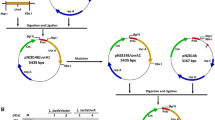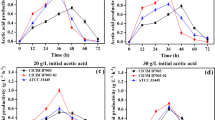Abstract
Acetic acid bacteria (AAB) are widely used in acetic acid fermentation due to their remarkable ability to oxidize ethanol and high tolerance against acetic acid. In Acetobacter pasteurianus, nucleotide excision repair protein UvrA was up-regulated 2.1 times by acetic acid when compared with that without acetic acid. To study the effects of UvrA on A. pasteurianus acetic acid tolerance, uvrA knockout strain AC2005-ΔuvrA, uvrA overexpression strain AC2005 (pMV24-uvrA), and the control strain AC2005 (pMV24), were constructed. One percent initial acetic acid was almost lethal to AC2005-ΔuvrA. However, the biomass of the UvrA overexpression strain was higher than that of the control under acetic acid concentrations. After 6% acetic acid shock for 20 and 40 min, the survival ratios of AC2005 (pMV24-uvrA) were 2 and 0.12%, respectively; however, they were 1.5 and 0.06% for the control strain AC2005 (pMV24). UvrA overexpression enhanced the acetification rate by 21.7% when compared with the control. The enzymes involved in ethanol oxidation and acetic acid tolerance were up-regulated during acetic acid fermentation due to the overexpression of UvrA. Therefore, in A. pasteurianus, UvrA could be induced by acetic acid and is related with the acetic acid tolerance by protecting the genome against acetic acid to ensure the protein expression and metabolism.






Similar content being viewed by others
References
Akiko OK, Wang Y, Sachiko K, Kenji T, Yukimichi K, Fujiharu Y (2002) Cloning and characterization of groESL operon in Acetobacter aceti. J Biosci Bioeng 94:140–147. https://doi.org/10.1016/S1389-1723(02)80134-7
Brennan L, Morris G, Wasson G, Hannigan B, Barnett Y (2000) The effect of vitamin C or vitamin E supplementation on basal and H2O2-induced DNA damage in human lymphocytes. Brit J Nutr 84(2):195–202. https://doi.org/10.1017/S0007114500001422
Cappa F, Cattivelli D, Cocconcelli P (2005) The uvrA gene is involved in oxidative and acid stress responses in Lactobacillus helveticus CNBL1156. Res Microbiol 156(10):1039–1047. https://doi.org/10.1016/j.resmic.2005.06.003
Cotter P, Hill C (2003) Surviving the acid test: responses of gram-positive bacteria to low pH. Microbiol Mol Biol R 67(3):429–453. https://doi.org/10.1128/mmbr.67.3.429-453.2003
De Laat W, Jaspers N, Hoeijmakers J (1999) Molecular mechanism of nucleotide excision repair. Genes Dev 13:768–785. https://doi.org/10.1101/gad.13.7.768
Doolittle R, Johnson M, Husain I, Houten B, Thomas D, Sancar A (1986) Domainal evolution of a prokaryotic DNA repair protein and its relationship to active-transport proteins. Nature 323:451–453. https://doi.org/10.1038/323451a0
Drouin R, Gao S, Holmquist G (1996) Agarose gel electrophoresis for DNA damage analysis. Technologies for Detection of DNA Damage & Mutations. Springer, Boston, pp 37–43. https://doi.org/10.1007/978-1-4899-0301-3_337-43
Fukaya M, Takemura H, Okumura H, Kawamura Y, Horinouchi S, Beppu T (1990) Cloning of genes responsible for acetic acid resistance in Acetobacter aceti. J Bacteriol 172:2096–2104 http://jb.asm.org/content/172/4/2096
Fukaya M, Tayama K, Tamaki T, Tagami H, Okumura H, Kawamura Y (1989) Cloning of the membrane-bound aldehyde dehydrogenase gene of Acetobacter polyoxogenes and improvement of acetic acid production by use of the cloned gene. Appl Environ Microbiol 55:171–176 http://aem.asm.org/content/55/1/171
Gavrieli Y, Sherman Y, Ben-Sasson S (1992) Identification of programmed cell death in situ via specific labeling of nuclear DNA fragmentation. Cell Bio 119:493–501. https://doi.org/10.1083/jcb.119.3.493
Greer S, Zamenhof S (1962) Studies on depurination of DNA by heat. J Mol Biol 4(3):123–141. https://doi.org/10.1016/S0022-2836(62)80046-1
Grinholc M, Rodziewicz A, Forys K, Rapackazdonczyk A, Kawiak A, Domachowska A, Golunski G, Wolz C, Mesak L, Becker K (2015) Fine-tuning recA expression in Staphylococcus aureus for antimicrobial photoinactivation: importance of photo-induced DNA damage in the photoinactivation mechanism. Appl Microbiol Biotechnol 99(21):9161–9176. https://doi.org/10.1007/s00253-015-6863-z
Hahn K, Faustoferri R, Quivey J (1999) Induction of an AP endonuclease activity in Streptococcus mutans during growth at low pH. Mol Microbiol 31:1489–1498. https://doi.org/10.1046/j.1365-2958.1999.01292.x
Hattori R, Yamada K, Kikuchi M, Hirano S, Yoshida N (2011) Intramolecular carbon isotope distribution of acetic acid in vinegar. J Agric Food Chem 59:9049–9053. https://doi.org/10.1021/jf200227e
Ishikawa M, Okamoto-Kainuma A, Jochi T, Suzuki I, Matsui K, Kaga T, Koizumi Y (2010) Cloning and characterization of grpE in Acetobacter pasteurianus NBRC 3283. J Biosci Bioeng 109(1):25–31. https://doi.org/10.1016/j.jbiosc.2009.07.008
Kuper J, Kisker C (2012) Damage recognition in nucleotide excision DNA repair. Curr Opin Struct Biol 22(1):88–93. https://doi.org/10.1016/j.sbi.2011.12.002
Mullins E, Francois J, Kappock T (2008) A specialized citric acid cycle requiring succinyl-coenzyme A (CoA):acetate CoA-transferase (AarC) confers acetic acid resistance on the acidophile Acetobacter aceti. J Bacteriol 190(14):4933–4940. https://doi.org/10.1128/JB.00405-08
Nakano S, Fukaya M (2008) Analysis of proteins responsive to acetic acid in Acetobacter: molecular mechanisms conferring acetic acid resistance in acetic acid bacteria. Int J Food Microbiol 125(1):54–59. https://doi.org/10.1016/j.ijfoodmicro.2007.05.015
Nie Z, Zheng Y, Du H, Xie S, Wang M (2015) Dynamics and diversity of microbial community succession in traditional fermentation of Shanxi aged vinegar. Food Microbiol 47:62–68. https://doi.org/10.1016/j.fm.2014.11.006
Okamoto-Kainuma A, Yan W, Fukaya M, Tukamoto Y, Ishikawa M, Koizumi Y (2004) Cloning and characterization of the dnaKJ operon in Acetobacter aceti. J Biosci Bioeng 97:339–342. https://doi.org/10.1016/S1389-1723(04)70216-9
Poorbagher H, Moghaddam M, Eagderi S, Farahmand H (2016) Estimating the DNA strand breakage using a fuzzy inference system and agarose gel electrophoresis, a case study with toothed carp Aphanius sophiae exposed to cypermethrin. Ecotoxicology 25(5):1040–1046. https://doi.org/10.1007/s10646-016-1647-5
Ribeiro G, Corte-Real M, Johansson B (2006) Characterization of DNA damage in yeast apoptosis induced by hydrogen peroxide, acetic acid, and hyperosmotic shock. Mol Biol Cell 17(10):4584–4591. https://doi.org/10.1091/mbc.E06-05-0475
Sambrook J, Russell D (2016) Molecular cloning: a laboratory manual (third edition). Cold Spring Harbor Laboratory 49:895–909 http://www.openisbn.org/download/0879695765
Sancar A, Rupp W (1983) A novel repair enzyme: UVRABC excision nuclease of Escherichia coli cuts a DNA strand on both sides of the damaged region. Cell 33:249–260. https://doi.org/10.1016/0092-8674(83)90354-9
Sancar A, Tang M (1993) Nucleotide excision repair. Photochem Photobiol 57(5):905–921. https://doi.org/10.1111/j.1751-1097.1993.tb09233.x
Sengun I, Karabiyikli S (2011) Importance of acetic acid bacteria in food industry. Food Control 22(5):647–656. https://doi.org/10.1016/j.foodcont.2010.11.008
Solieri L, Giudici P (2009) Vinegars of the world. Springer, Milan, pp 1–16. https://doi.org/10.1007/978-88-470-0866-3_1
Trcek J, Jernejc K, Matsushita K (2007) The highly tolerant acetic acid bacterium Gluconacetobacter europaeus adapts to the presence of acetic acid by changes in lipid composition, morphological properties and PQQ-dependent ADH expression. Extremophiles 11(4):627–635. https://doi.org/10.1007/s00792-007-0077-y
Trcek J, Toyama H, Czuba J, Misiewicz A, Matsushita K (2006) Correlation between acetic acid resistance and characteristics of PQQ-dependent ADH in acetic acid bacteria. Appl Microbiol Biotechnol 70(3):366–373. https://doi.org/10.1007/s00253-005-0073-z
Van de Guchte M, , Serror P, Chervaux C, Smokvina T, Ehrlich S, Maguin E (2002) Stress responses in lactic acid bacteria. Antonie Van Leeuwenhoek 82(1–4):187 doi:https://doi.org/10.1023/A:1020631532202, 216
Van Houten B, Croteau D, DellaVecchia M, Wang H, Kisker C (2005) ‘Close-fitting sleeves’: DNA damage recognition by the UvrABC nuclease system. Mutat Res 577(1–2):92–117. https://doi.org/10.1016/j.mrfmmm.2005.03.013
Verhoeven E, Wyman C, Moolenaar G, Goosen N (2002) The presence of two UvrB subunits in the UvrAB complex ensures damage detection in both DNA strands. EMBO J 21:4196–4205. https://doi.org/10.1093/emboj/cdf396
Wang B, Shao Y, Chen T, Chen W, Chen F (2015) Global insights into acetic acid resistance mechanisms and genetic stability of Acetobacter pasteurianus strains by comparative genomics. Sci Rep 5:18330. https://doi.org/10.1038/srep18330
Wei L, Zhu D, Zhou J, Zhang J, Zhu K, Du L, Hua Q (2014) Revealing in vivo glucose utilization of Gluconobacter oxydans 621H Δmgdh strain by mutagenesis. Microbiol Res 169(5–6):469–475. https://doi.org/10.1016/j.micres.2013.08.002
Xia K, Zang N, Zhang J, Zhang H, Li Y, Liu Y, Feng W, Liang X (2016) New insights into the mechanisms of acetic acid resistance in Acetobacter pasteurianus using iTRAQ-dependent quantitative proteomic analysis. Int J Food Microbiol 238:241–251. https://doi.org/10.1016/j.ijfoodmicro.2016.09.016
Yamamoto N, Kato R, Kuramitsu S (1996) Cloning, sequencing and expression of the uvrA gene from an extremely thermophilic bacterium, Thermus thermophilus HB8. Gene 171:103–106. https://doi.org/10.1016/0378-1119(96)00052-2
Yin H, Zhang R, Xia M, Bai X, Mou J, Zheng Y, Wang M (2017) Effect of aspartic acid and glutamate on metabolism and acid stress resistance of Acetobacter pasteurianus. Microb Cell Factories 16:109–115. https://doi.org/10.1186/s12934-017-0717-6
Zheng Y, Chen X, Wang J, Yin H, Wang L, Wang M (2015) Expression of gene uvrA from Acetobacter pasteurianus and its tolerance to acetic acid in Escherichia coli. In: Zhang TC, Nakajima M (eds) Advances in Applied Biotechnology. Lecture Notes in Electrical Engineering, vol 333. Springer, Berlin, Heidelberg, pp 163–169. https://doi.org/10.1007/978-3-662-46318-5_18
Zheng Y, Zhang R, Yin H, Bai X, Chang Y, Xia M, Wang M (2017) Acetobacter pasteurianus metabolic change induced by initial acetic acid to adapt to acetic acid fermentation conditions. Appl Microbiol Biotechnol 101:7007–7016. https://doi.org/10.1007/s00253-017-8453-8
Zhu K, Lu L, Wei L, Wei D, Imanaka T, Hua Q (2011) Modification and evolution of Gluconobacter oxydans for enhanced growth and biotransformation capabilities at low glucose concentration. Mol Biotechnol 49(1):56–64. https://doi.org/10.1007/s12033-011-9378-6
Acknowledgements
The authors would like to acknowledge the Mizkan Group Corporation, Japan, for their plasmid pMV24 and Dr. Wei Liujing (East China University of Science and Technology, China) for gifting the plasmids pSUP202 and pRK2013.
Funding
This work was supported by the National Natural Science Foundation of China (31201406, 31671851), Tianjin Municipal Science and Technology Commission (16YFZCNC00650, 17PTGCCX00190), Rural Affairs Committee of Tianjin (201701180), Program for Changjiang Scholars and the Innovative University Research Team (IRT15R49), and the Innovative Research Team of Tianjin Municipal Education Commission (TD13-5013).
Author information
Authors and Affiliations
Corresponding author
Ethics declarations
Conflict of interest
The authors declare that they have no competing interests.
Ethical statement
This article does not contain any studies with human participants or animals performed by any of the authors.
Rights and permissions
About this article
Cite this article
Zheng, Y., Wang, J., Bai, X. et al. Improving the acetic acid tolerance and fermentation of Acetobacter pasteurianus by nucleotide excision repair protein UvrA. Appl Microbiol Biotechnol 102, 6493–6502 (2018). https://doi.org/10.1007/s00253-018-9066-6
Received:
Revised:
Accepted:
Published:
Issue Date:
DOI: https://doi.org/10.1007/s00253-018-9066-6




